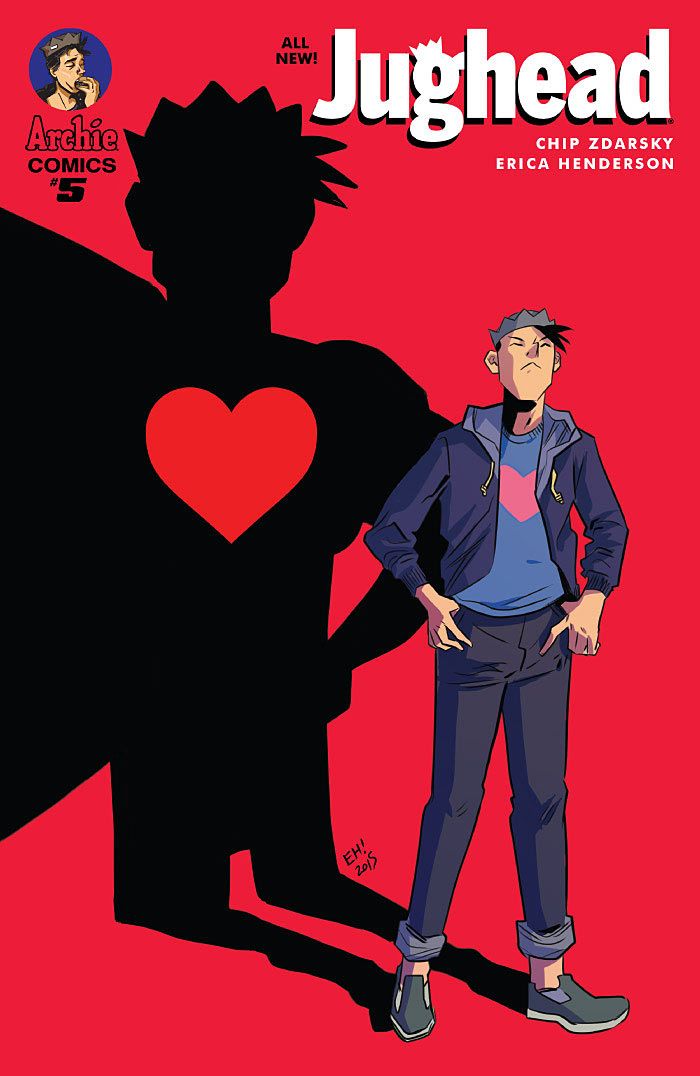Chip Zdarsky and Erica Henderson keep the jokes and the shakes coming in "Jughead" #5. As Riverdale High's curriculum gets more and more military, the gang sets out to discover where exactly their new principal came from. This issue is full of absurdities -- doppelgangers, superhero fantasies and convenient fainting fits -- all grounded in Jughead's endearingly defiant self-confidence. "Jughead" still isn't moving very quickly, but every issue is just charming enough to buy some more indulgence from the reader.
Henderson is an ideal artist for this title. I can see the stylistic through lines, not only from her justifiably popular work on "Squirrel Girl" but from the vintage Jughead comics in the back of every issue. She brings two crucial skills to the series: a humorous eye for bravado and exaggeration and a knack for warm, casually cartoony settings. Archie Comics' small-town-ness has always been part of their appeal; Henderson makes Riverdale feel small while allowing the characters' reactions and emotions feel big. Andre Syzmanowicz' bright, pop-sensible palette reinforces this feel. He rides a line between classic and modern, making some really excellent use of pinks to balance everything out. Best of all, their work rewards a closer look, with jokes nested in menus, signs and random figures in the background.
Zdarsky's script is also reliably funny, and he knows how to play the Riverdale cast off one another. Even perennial villain Reggie gets to be clever (and strangely helpful). There's a character-centric element to even the most slapstick jokes. A funny story without heart, though, is just a funny story. The creative team has happily landed on what might actually be loveable about a gluttonous, lazy swindler: Jughead's self-love and self-belief, despite all the circumstances and institutions that tell him to feel otherwise. There's something weirdly likeable about that. Zdarsky captures this in lines like "Me! Sensible Jughead!" and "Man, what a dumb name. I'm Jughead." The reader is certainly invited to chuckle at this, but it's not made out to be a vice. Indeed, Jughead's resistance to voices of authority and popular opinion is the driver of most plot points.
However, the fantasy sequences are still my least favorite part of this series. Personally, I don't get too much from them. Much of the humor I find in "Jughead" comes from the exaggerated gravity of quests for hamburgers or missions to the mall, the character moments or the way that Jughead turns ordinary logic against itself, drawing out the absurdity in everyday institutions. The fantasy sequences don't allow for as much play between Jughead's perspective and the wider world; they're more straight-facedly outlandish. I always get fewer laughs on those pages. In addition, they slow down the rest of the plot, so I have trouble justifying their inclusion when they aren't adding to my experience.
That said, I understand that the fantasy sequences are a crucial part of the fun for many readers -- and whatever its flaws, "Jughead" #5 is a super enjoyable read. Zdarsky and Henderson have found a way to treat this punchline of a character as the hero of his own story, and the result is as odd as it is appealing.

